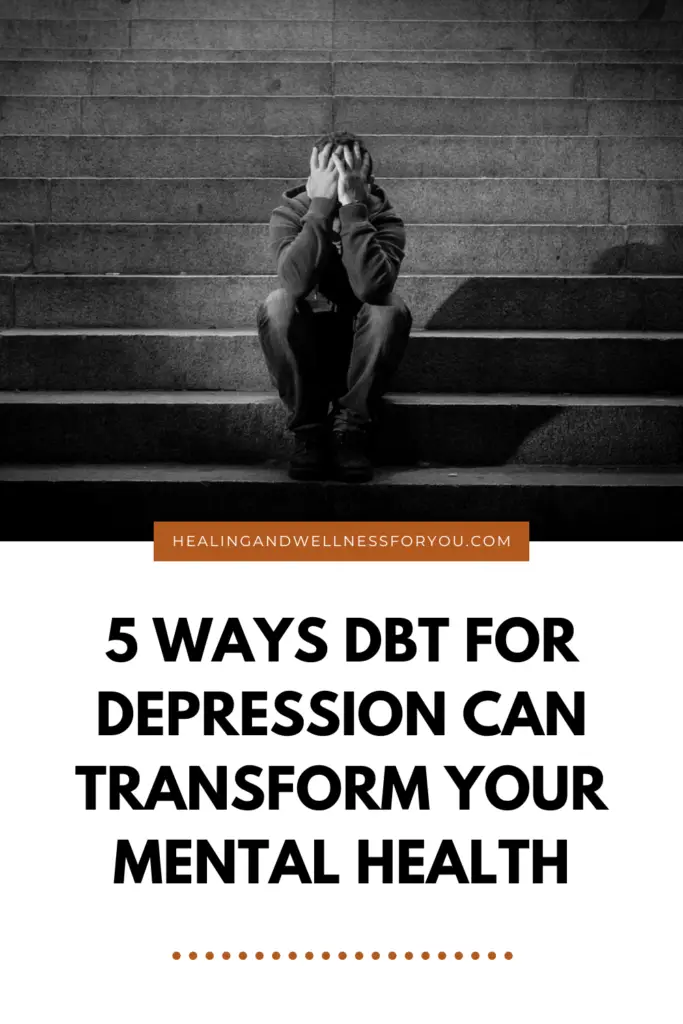5 Ways Dialectical Behavior Therapy – DBT for Depression – Can Transform Your Mental Health
5 Ways Dialectical Behavior Therapy – DBT for Depression – Can Transform Your Mental Health

As a therapist, it is important to me to offer clients the most researched, effective treatment to help them with their mental health challenges. I have found DBT to be effective and consistently helpful in promoting a reduction in depression symptoms and improvement in mental health.
Individuals struggling with depression need options that help them find relief and hope for their depressive symptoms. When seeking therapy, many individuals with depression already feel overwhelmed in their daily lives, and finding the right help can be a daunting undertaking. How do you know what works best for depression? What does that look like in application in real life? There are many modalities of therapy, and most can be helpful in some manner with mental health and depression. The key is understanding what therapies work well with depression for reducing symptoms and finding helpful tools that are tangible.
Dialectical Behavior Therapy is a comprehensive treatment approach developed by Dr. Marsha Linehan. Dialectical Behavior Therapy (DBT) offers a powerful approach to managing depression. This therapeutic method combines cognitive-behavioral techniques with mindfulness strategies, providing individuals with practical tools to navigate their emotions and improve their overall well-being. Many people have used this therapeutic method to help when faced with mental health challenges that are impacting their lives and relationships. By focusing on acceptance and change simultaneously, DBT helps individuals develop a more balanced perspective on their experiences and learn practical ways to respond to depressive symptoms.
DBT teaches four core skill sets:
- Mindfulness
- Distress tolerance
- Emotional regulation
- Interpersonal effectiveness
These skills help individuals manage emotions, navigate relationships, and cope with challenging situations more effectively. DBT sessions typically involve individual therapy, group skills training, and phone coaching. This multi-faceted approach ensures consistent support and skill reinforcement.
Importance of DBT in Treating Depression
DBT has shown significant effectiveness in treating depression, particularly for individuals who haven’t responded well to other therapies.
Key benefits of DBT for depression include:
- Improved emotional regulation
- Enhanced coping mechanisms
- Better interpersonal relationships
- Reduced self-destructive behaviors
DBT’s emphasis on mindfulness helps individuals stay present and avoid rumination, a common issue in depression. DBT therapy also promotes self-acceptance while encouraging positive change.
Research has demonstrated DBT’s efficacy in reducing depressive symptoms and improving overall quality of life for many patients.
What is Depression and DBT?
Depression and Dialectical Behavior Therapy (DBT) are key concepts in mental health treatment. Depression impacts millions globally, while DBT offers effective strategies for managing emotional challenges.
Depression is a mental health disorder characterized by persistent feelings of sadness, hopelessness, and loss of interest in daily activities. Symptoms often include changes in sleep patterns, appetite fluctuations, and difficulty concentrating. Physical manifestations may involve fatigue, headaches, or unexplained aches. Emotional symptoms can range from irritability to intense feelings of worthlessness.
Depression can significantly impair daily functioning, affecting work, relationships, and overall quality of life. It’s important to note that depression is more than just feeling sad; it’s a complex condition requiring professional attention.
5 Ways DBT Can Help with Depression

DBT offers five primary ways to address depression:
- Mindfulness practices to increase awareness and reduce negative thought patterns
- Emotion regulation techniques to manage intense feelings
- Distress tolerance skills to cope with difficult situations
- Interpersonal effectiveness strategies to improve relationships
- Behavioral activation to increase engagement in positive activities
These approaches work together to provide a comprehensive toolkit for managing depressive symptoms and fostering long-term emotional well-being.
1. Mindfulness Techniques
Mindfulness involves paying attention to the present moment without judgment. It helps individuals with depression become more aware of their thoughts and feelings without getting caught up in them. Mindfulness can reduce rumination and increase self-awareness.
DBT incorporates various mindfulness exercises to help manage depressive symptoms. These include:
- Observing thoughts: Noticing thoughts without engaging with them
- Body scan: Focusing attention on different parts of the body
- Mindful breathing: Paying attention to the breath
- Wise mind: Balancing emotion and reason
These exercises can help individuals stay grounded and reduce the intensity of depressive episodes.
2. Emotional Regulation Skills
Emotion regulation is crucial in managing depression. It involves recognizing, understanding, and modifying emotional responses. Improved emotion regulation can lead to more stable moods and better overall functioning.
DBT teaches several strategies for emotional regulation:
- Identifying and labeling emotions
- Increasing positive emotional experiences
- Reducing vulnerability to negative emotions
- Opposite action: Acting opposite to the current emotion when it’s not justified
- Problem-solving: Addressing situations that trigger negative emotions
These strategies help individuals gain more control over their emotional experiences, reducing the impact of depressive symptoms.
3. Interpersonal Effectiveness
Interpersonal relationships play a significant role in depression. Difficulties in relationships can exacerbate depressive symptoms, while positive relationships can provide support and improve mood.
DBT focuses on developing practical interpersonal skills to improve relationships and manage depression:
- DEAR MAN: A technique for making requests and setting boundaries
- GIVE: Guidelines for maintaining relationships
- FAST: Strategies for preserving self-respect in interactions
These skills help individuals communicate more effectively, assert their needs, and build healthier relationships, which can significantly impact their depressive symptoms.
4. Distress Tolerance
Distress tolerance skills help individuals endure difficult emotions and situations without worsening them. For those with depression, these skills are crucial in managing overwhelming feelings and preventing harmful behaviors.
DBT offers several techniques to improve distress tolerance:
- TIP Skills: Temperature change, Intense exercise, Paced breathing, Progressive muscle relaxation
- Self-Soothing: Using the five senses to calm oneself
- Radical Acceptance: Accepting reality as it is without fighting against it
- Distraction: Engaging in activities to shift focus from distressing thoughts
These techniques provide practical tools for managing depressive episodes and preventing their escalation.
5. Cognitive Restructuring
Cognitive distortions are inaccurate thought patterns that contribute to depression. Common distortions include:
- All-or-nothing thinking
- Overgeneralization
- Catastrophizing
- Personalization
Recognizing these patterns is the first step in addressing them.
DBT incorporates cognitive restructuring techniques to challenge and modify negative thought patterns:
- Identifying automatic thoughts
- Examining evidence for and against thoughts
- Generating alternative explanations
- Practicing reality testing
By addressing these cognitive distortions, individuals can develop a more balanced perspective, reducing the impact of depressive thoughts and improving overall mood.
Integrating DBT with Other Treatment Approaches

DBT can be effectively combined with other therapeutic approaches and medications to enhance treatment outcomes for depression. This integration allows for a more comprehensive and personalized approach to managing symptoms and improving overall well-being.
DBT works well alongside other evidence-based therapies for depression. Cognitive Behavioral Therapy (CBT) techniques can complement DBT skills, reinforcing cognitive restructuring and behavioral activation.
Mindfulness-based therapies like Mindfulness-Based Cognitive Therapy (MBCT) align with DBT’s core mindfulness practices. Interpersonal Psychotherapy (IPT) can be integrated to address relationship issues that often contribute to depression. Acceptance and Commitment Therapy (ACT) principles can enhance DBT’s focus on acceptance and change.
Regular communication between the psychiatrist and DBT therapist ensures coordinated care.
Other complementary therapies may include:
- Art therapy
- Music therapy
- Exercise programs
- Nutritional counseling
This multi-modal approach addresses various aspects of depression, potentially leading to more robust and sustainable improvements in mood and functioning.
Tips for Finding DBT Practitioners and Programs
Finding qualified DBT therapists and programs is crucial for effective treatment.
Selecting an adequately trained DBT therapist is essential for successful treatment outcomes. The following are helpful tips:
- Look for therapists who have completed intensive DBT training and maintain ongoing education.
- Certified DBT clinicians have demonstrated proficiency in delivering the full DBT protocol.
- Ask potential therapists about their specific DBT training and experience.
- Inquire if they offer all modes of DBT treatment, including individual therapy, skills training groups, and phone coaching.
- Ensure they adhere to the core DBT principles and use evidence-based DBT techniques.
- Consider therapists in DBT consultation teams, as this is critical to delivering high-quality DBT.
Several avenues exist for locating DBT therapists and programs:
- Professional directories like Psychology Today allow searches specifically for DBT providers.
- Filter results by location, insurance accepted, and other preferences.
- Contact local mental health clinics, hospitals, or university psychology departments to inquire about DBT offerings. Some may have dedicated DBT programs or know of community resources.
- Use online therapy platforms that connect clients with licensed therapists trained in DBT. These services often accept insurance and provide flexible scheduling options.
- National organizations focused on DBT, such as the DBT-Linehan Board of Certification, maintain databases of certified practitioners.
- Your insurance provider may also have a list of in-network DBT therapists.
Wrap-Up
Dialectical Behavior Therapy offers powerful, valuable tools for managing depression. Its focus on mindfulness, emotion regulation, distress tolerance, and interpersonal effectiveness can significantly improve mood and overall well-being. These skills work together to address various aspects of depression, from negative thought patterns to challenging interpersonal dynamics. This therapy is effective due to its practical skills approach combined with psychoeducation and support from your therapist.
DBT is a versatile therapy that can be applied to several life challenges, not just depression. This applicability makes it a valuable tool for long-term mental health and personal growth. The therapy’s emphasis on balancing acceptance and change can lead to profound shifts in how individuals relate to themselves and their experiences.

Frequently Asked Questions
What is DBT, and how is it different from other types of therapy for depression?
DBT (Dialectical Behavior Therapy) is a form of cognitive-behavioral therapy (CBT) that emphasizes balancing acceptance and change. Unlike traditional CBT, which focuses mainly on changing negative thoughts, DBT integrates mindfulness and emotion regulation skills, making it particularly effective for people with intense emotions or chronic depression.
Can DBT be used to treat major depressive disorder (MDD)?
Yes, DBT is often used to treat MDD, especially when depression is accompanied by emotional dysregulation, self-harm, or suicidal thoughts. While it was initially developed for borderline personality disorder, its principles are highly adaptable to depression.
How does DBT help with managing depressive symptoms?
DBT helps by teaching skills like mindfulness to stay present, emotion regulation to manage mood swings, distress tolerance to cope with crises, and interpersonal effectiveness to improve relationships. These skills reduce feelings of helplessness and promote resilience.
Is DBT effective for treatment-resistant depression?
DBT has shown promise for individuals with treatment-resistant depression. By focusing on practical skills and improving emotional regulation, it offers a new approach for those who haven’t responded well to other therapies or medications.
How long does DBT for depression typically take?
DBT is structured, with standard programs lasting around six months to a year. Some people may continue with individual therapy or groups for ongoing support.
About the Author

Erin Steck, Licensed Associate Counselor
Erin is a dedicated therapist passionate about helping individuals heal and grow. With experience supporting children, adolescents, and adults, she specializes in addiction, trauma, grief, and mental health challenges. Using approaches like Dialectical Behavioral Therapy, Mindfulness, and Narrative Therapy, Erin creates a safe space for clients to feel heard, recognize their strengths, and achieve lasting change.
“My goal is to empower you to find hope, healing, and trust in your journey toward better mental health.”








